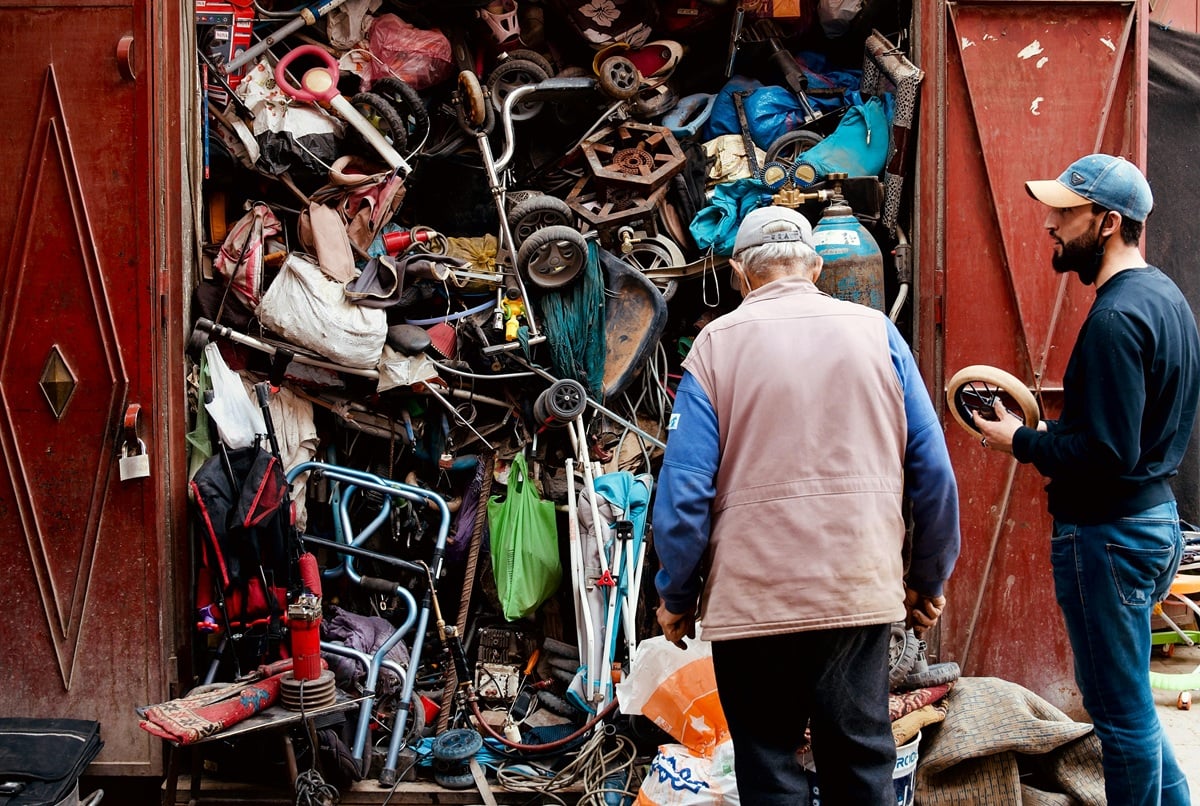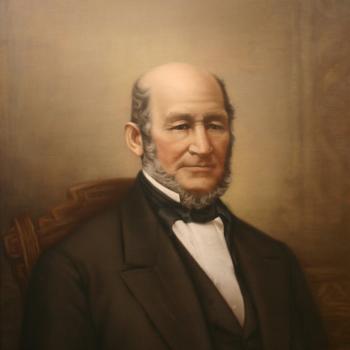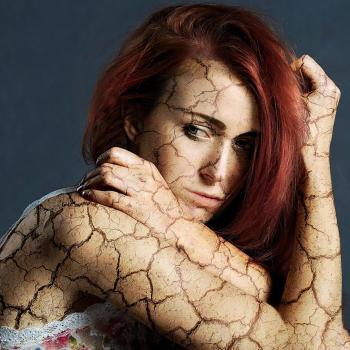The term “demonic possessions” suggests devils enslaving people. But it’s really the demonic grip a hoarder’s possessions have on them.

I have walked with people through some of the toughest times in their lives. Grief, loss, mental illness, addiction, and heartbreak take a toll on even the healthiest of people. One of the most misunderstood struggles that I’ve seen is hoarding disorder. Many people consider hoarders to be lazy, disorganized, gluttonous people. But there is something far deeper. Hoarding is not just about the uncontrolled gathering of belongings. It is a disease of the soul—one from which people can be set free.
Hoarders’ Homes
When I was a pastor visiting the homes of church members living with hoarding disorder, they often opened the door with embarrassed faces, considering whether they would invite me in at all. On the off chance that they would let me inside, they would lead me through a jumbled house where piles of papers and other paraphernalia towered like skyscrapers. Since their own chair was the sole space in the house not littered with leftovers, they had to clear a spot for me to sit. Offering their guest a drink or snack would be unthinkable, as the kitchen was messy to a level of unhealthy and humiliating. Hoarding disorder not only controlled their lives—it affected their relationships with others as well.
The Idolatry of Hoarding
Back when I used to preach, I often spoke about idolatry, which is more than just bowing down to a golden calf. Idolatry is placing anything above God in our lives to the degree that it becomes an object of worship. In hoarding disorder, objects take first place in a person’s mind, gaining pre-eminence over everything else. They demand space in the home, the attention it takes to maintain them, and even reverence as sacred objects.
Devilish Belongings
Over time, hoarded items cease to be possessions and instead become their own sorts of demons, as it were. These devilish belongings hold dominion over a person’s mind, controlling them and keeping them captive. When people can no longer sit at their own table, sleep in their own bed, or walk freely across their own floor, the things they own have taken possession of their life. Whether you believe in literal demons or not, the metaphor of possession is appropriate. Hoarding disorder is like demonic possession in two ways. First, it keeps a person prisoner both in body and mind. Second, there is a way to be set free.
Personality Profiles
As a behavioral health specialist, I’ve come to understand that hoarding disorder is classified as a mental health condition in the DSM-5. Usually, hoarding can be traced back to trauma, loss, depression, and anxiety. Here are a few hoarding personality profiles, as examples. Maybe you know a few of these people:
- The boy who grew up in poverty insists he will never live with scarcity again, so he retains everything he ever owned just in case it might be useful in the future.
- The little girl who suffered sexual abuse creates a buffer of belongings around her body, building a parapet of possessions to keep the abusers out.
- The individual who struggles with dysthymia may not have the energy to get out of bed in the morning, much less do the dishes. So, carryout containers clutter the kitchen, making it completely unusable. As a spiraling result of an untidy kitchen, increasing takeaway orders become both the solution and the problem.
- The person who experiences grief so profoundly that everything reminds them of departed loved ones clings to each object as if it were a religious relic. The result is a home that becomes both a fortress and prison, sanctuary, and tomb.
More Than Messy Homes
You might think that hoarding disorder is only for people with a home in which to hoard, but this is far from true. For example, you may have seen homeless hoarders pushing trains of shopping carts tied together with rope. You wonder how they can stand the inconvenience of having to push all their stuff around. But for them, the thought of losing these items is worse than the potential freedom they might enjoy were they to shed them. This disorder isn’t just about messy homes but also messy minds.
Hoarding Creates Isolation
Hoarding disorder creates difficulties with social connections and relationships. Partners of hoarders either leave or fall into their own unhealthy coping mechanisms as they live with the mess. The family grows distant as awkwardness and shame prevent visitation. Church family stays away, furthering the isolation. Those who suffer from the disease long to practice hospitality yet instead find themselves in the grip of a demonic bondage that strains friendship and kinship alike. Hoarding disorder separates people not only from others but also from themselves and, consequently, from God.
Forced Clean-Outs
If you want to help someone with hoarding, it’s important to note that forced clean-outs are usually ineffective and generally harmful. You may have seen episodes of the TV show “Hoarders,” in which concerned family members coerce their loved ones to throw all their junk in dumpsters. Fights and arguments ensue, making good television. Even if the hoarder is eventually cooperative, after a few months the situation has returned. This reminds me of Jesus’s statement in Matthew 12:43-45:
“When the unclean spirit has gone out of a person, it wanders through waterless regions looking for a resting place, but it finds none. Then it says, ‘I will return to my house from which I came.’ When it returns, it finds it empty, swept, and put in order. Then it goes and brings along seven other spirits more evil than itself, and they enter and live there, and the last state of that person is worse than the first….”
Debate the reality or unreality of unclean spirits if you will. It matters little whether you believe in demons as spiritual entities or simply as metaphors for evil. Hoarding disorder creates captives in either case. You can clean the house all you want, but unless you deal with the unseen cause of the disorder, in a few months, the hoarding is going to be worse than before.
Instead of forced clean-outs, it’s better to focus on relationships rather than judgment to support the individual. It’s a slow, methodical process to help a hoarder. This must be done with love and understanding, addressing their trauma and anxiety alongside the physical hoard. Behavioral health therapy is probably in order, as it takes a professional level of expertise to help hoarders unpack the foundations of their disorder. They must rediscover their intrinsic worth apart from the material things they’ve accumulated.
Jesus Healed Hoarders
Throughout his ministry, Jesus freed those possessed with evil spirits. He healed people from illness and fear. He even healed people of their hoards. On one of his adventures, Jesus encountered the tax collector Zacchaeus who extorted his own people in the name of Rome. The little man discovered something in Jesus that was greater than his hoard of wealth. He gave it up and gave it back in exchange for Jesus, his “pearl of great price.”
Wealth as a Form of Hoarding
Yes, wealth can be a form of hoarding disorder. There’s something insane about wealthy people who see the suffering around them and do not do their part to alleviate the need. The hoarding disorder evidenced by billionaires who underpay their employees and use their money to oppress the poor can only be described as demonic. And systems of inequality that favor the rich over those in poverty are conceived in the pit of hell.
But Jesus invites himself into the picture. As he ventured into Zacchaeus’s house, Jesus wants to bring healing to your home or that of your loved one with hoarding disorder. By reclaiming an identity as beloved of God and knowing that they are worthy beyond possessions, those with hoarding disorder can be truly free. And if freed people free people, then those released from the prison of possessions can liberate others as well.
When the Things You Own, Own You
When we use the phrase “demonic possessions,” many people imagine Hollywood films featuring diabolically inhabited victims crawling on the ceiling with their heads spinning around. This is not what I mean when I use the term here. But when the things you own, own you, their influence can be demonic indeed. Yet, through the patience and perseverance of loved ones, through professional therapy and pastoral care, people with hoarding disorder can be set free.


















